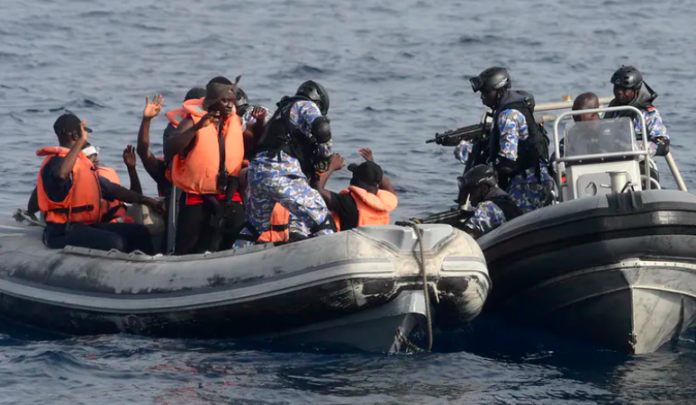The Gulf of Guinea has re-emerged as the global piracy hotspot – accounting for 90 percent of global kidnappings reported recently, with the number of crew taken increasing by more than 50 percent to 121, according to marine insurer Allianz Global Corporate & Specialty SE’s (AGCS) Safety & Shipping Review 2020. Allianz, in the report, stated that given heightened political and economic uncertainty in the world, piracy is a threat that is likely to remain for a long time.
The insurer said piracy remains a major risk for shipping. Last year, there were 162 incidents of piracy and armed robbery against ships worldwide – down from 201 in 2018. This is despite the recent success in tackling Somali pirates.
Somalia reported zero piracy incidents last year, a trend that continued through the beginning of 2020. However, Somali pirates continue to possess the capacity to carry out attacks in the Somali basin and wider Indian Ocean.
Large shipping losses are at a record low, having fallen by over 20 percent yearly. However, the coronavirus crisis, it said, could endanger the long-term safety improvements in the shipping industry for the year and beyond as difficult operating conditions and a sharp economic downturn present a unique set of challenges.
“Coronavirus has struck at a difficult time for the maritime industry as it seeks to reduce its emissions; navigate issues such as climate change, political risks and piracy; and deals with ongoing problems such as fires on vessels,” says Baptiste Ossena, Global Product Leader Hull Insurance, AGCS. “Now the sector also faces the task of operating in a very different world, with the uncertain public health and economic implications of the pandemic,” he added.
The yearly study analysis reported shipping losses over 100 gross tonnes (GT) and also identifies 10 challenges of the coronavirus crisis for the shipping industry which could impact safety and risk management.
In 2019, 41 total losses of vessels were reported around the world – down from 53 12-months earlier. This represents an approximate 70 percent decline over 10 years, and is a result of sustained efforts in the areas of regulation, training and technological advancement, among others.
More than 950 shipping losses have been reported since the start of 2010. Hijackings by Somalian pirates may have reduced for now, but incidents have been increasing in West Africa and parts of Asia – where we see a worrying pattern of violent attacks against crew, as well as kidnappings.
Following an active 2019, there has been no let-up in piracy in 2020. There were 47 attacks reported to the IMB in the first three months of the year; up from 38 in the same period last year, mostly targetting tankers as well as container ships and bulk carriers.
Again, the Gulf of Guinea accounted for the highest number of attacks (21); although there were also (five) vessels boarded in the Singapore Strait and several incidents of armed robbery in Latin America.
In April 2020, the Portugal-flagged container ship Tommi Ritscher became the latest vessel attacked by pirates in the Gulf of Guinea. While at the Cotonou Anchorage, Benin, the 4,785 teu Singapore-owned vessel was boarded by pirates and eight crew were kidnapped.
The incident followed the kidnapping of nine crew from the tanker Alpine Penelope in the same area during February 2020.










